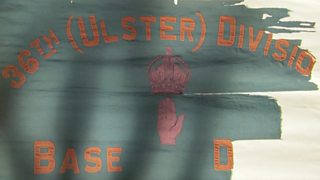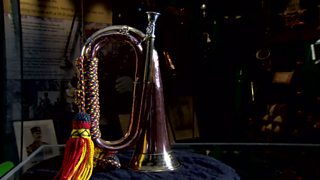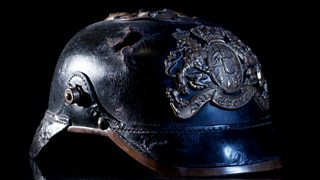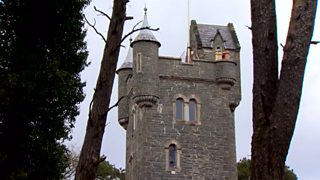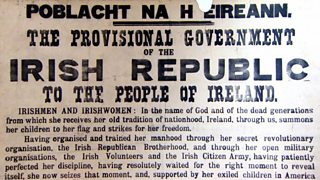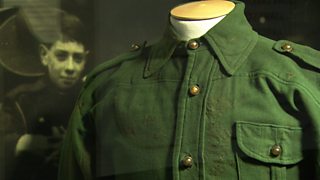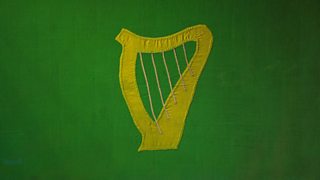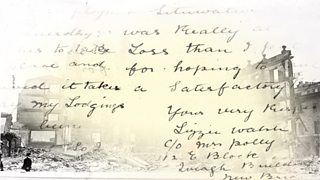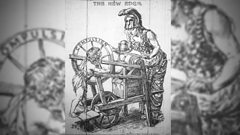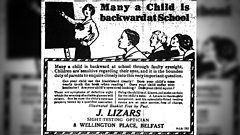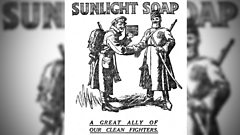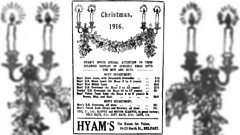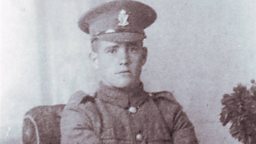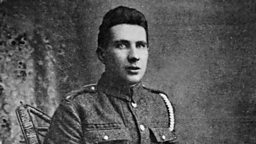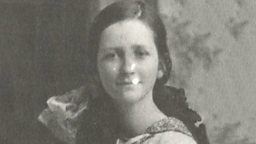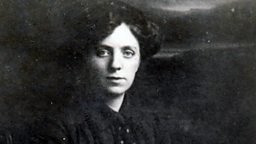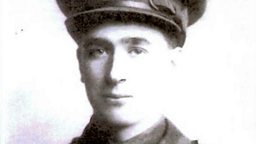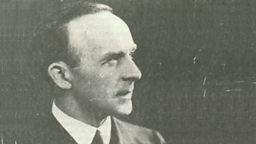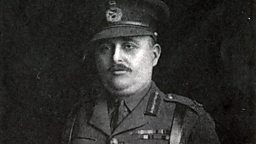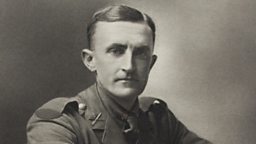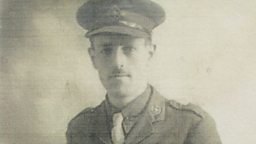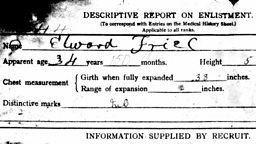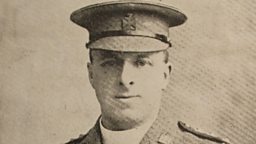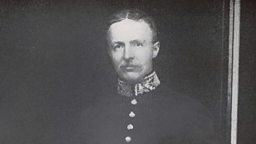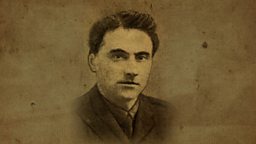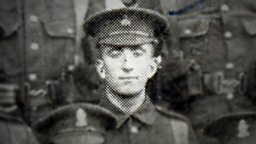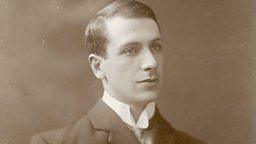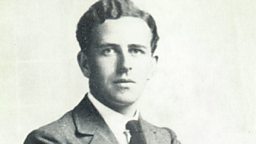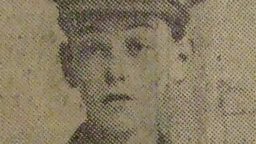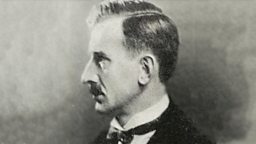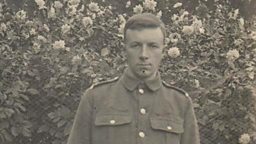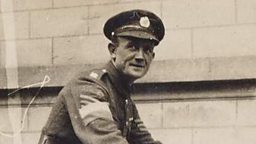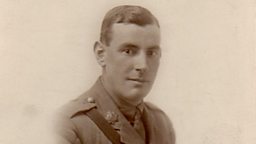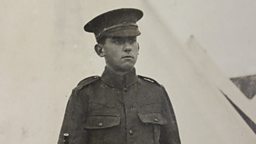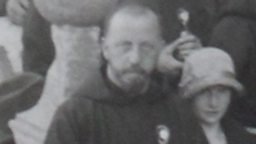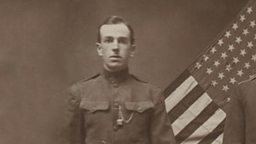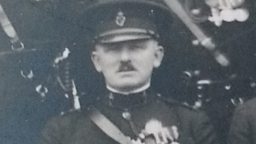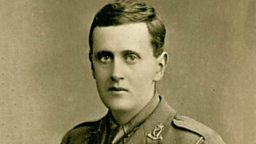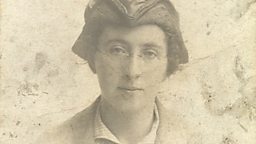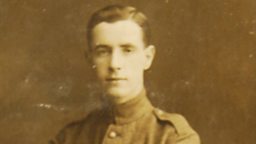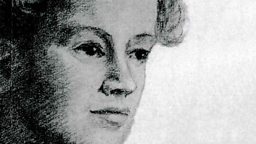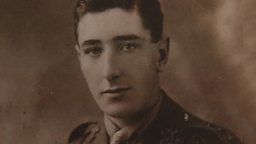Jack Christie
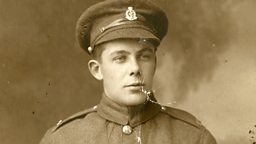
Somme stretcher bearer
Born in 1898, Jack Christie was living in the Shankill area of Belfast, and a mill worker – "I hated it" – when WW1 broke out in 1914.
In no way had it anything to do with patriotism, it was simply here’s an escape route, to get out of the mill, for surely life holds more than what this mill can offer
Having previously joined the Ulster Volunteer Force as a "first aid man", and a bugler, he enlisted with his friends for the British Army, aged just sixteen years: "we joined in a body – I remember marching down the Shankill Road."
A stretcher bearer, Jack Christie served with the 109th Field Ambulance, Royal Army Medical Corps, attached to the 36th (Ulster) Division.
He recalls the comradeship of the war as being key for him: "that was the great thing about the 36th Division, that they were all comrades, they were all from the one place – we didn’t know everybody but we knew they were Ulster people and we had the people we went to school with ..."
He felt too "your family were ... behind you all the time and all the way ... there was always the support from home."
On 1 July 1916, Jack was at the Battle of the Somme, where he remembered "we were carrying stretchers, for I don't know how many hours without stopping, up and down, up and down ..." It was, he recalled, "a terrible shambles."
Jack went on to serve at Ypres and Messines. On his demobilisation, he returned to Belfast, and went on to marry, have a family and live a long life.
After the war, he reflected of his experience: "Very wasteful. No glamour about war."
Early life
Jack Christie was born in Londonderry in 1898, and then moved to Belfast at a young age. By 1914, he recalls, he had "fairly comfortably off" parents, who had a pub and shop in Belfast's Shankill.
Jack left Agnes Street Central National School at 12 and worked at the Ulster Spinning Company in the Falls Road, Belfast, for "four shillings a week then as an apprentice." He was bored in his job – "I hated it. I hated it. It was an awful place working in a spinning mill in those days."
The Church Lads Brigade and UVF
Jack reflected on the politics of the time, before war broke out, in 1912: "... the Liberals had promised to bring in a Βι¶ΉΤΌΕΔ Rule bill to bring Βι¶ΉΤΌΕΔ Rule for us, much against our wishes. I didn't understand much about it but ... I had the feeling that something dreadful would happen if Βι¶ΉΤΌΕΔ Rule came in." With Sir Edward Carson holding meetings, Jack says "there was a great excitement and a tension that everyone felt."
Then just fourteen, Jack was he recalls a member of the Church Lads Brigade, St Luke's Company in Northumberland Street. There, he did courses in First Aid, subsequently becoming a "first aid man in the UVF because I could already put on a bandage and put a sling on."
Also in the bugle band, with a full uniform, Jack drilled with the Ulster Volunteers. In the south of Ireland, he says, "they had their own regiment ... and we were facing them, we in the north and they in the south ..." Then, in 1914, came the outbreak of war.
War and joining the Army
Jack found himself at the recruiting hall. He and his friends joined together: "I remember marching down the Shankill Road to the old Town Hall and joining up there."
The teenage boys knew each other: "... we were all, had been boys together most of us, we had been in the Church Lads Brigade together and we had played football, cricket in Woodvale Park, we were all friends knowing each other well ..."
Of his motivation, he said: "when I came to join up ...in no way had it anything to do with patriotism, it was simply here's an escape route, to get out of the mill, for surely life holds more than what this mill can offer."
Jack was now part of the Royal Army Medical Corps, with the 36th (Ulster) Division, and became a stretcher bearer in Field Ambulance. He was underage: "At the time when we joined up I was sixteen, we were supposed to be nineteen, we said we were nineteen."
And this new life, initially at least, was good: "For a while there was no place to put us, there were no camps ... it was great, no work to do, no mill, and as far as I remember we travelled free on the trams and we got into the Baths which is more important – we got into the Falls Baths free – and we were great swimmers, my wee crowd."
And once he arrived in France, the camaraderie only increased: "the comradeship ... it was something that had to grow, it didn't come to fruition till we went to France, and you weren't aware of it ..."
Trench life
As with many others, on reaching France, Jack's recollections were of the toughness of Army life. He described "the sort of life that plagued you in the trenches, apart altogether from the discomfort at limitations of food and movement, the fact that you never got your clothes off in the trenches ... everybody was lousy ... it was nothing to see men sitting with their shirt off, going round the seams of their shirt with blue ointment to kill these things."
Transport was difficult: "you weren't taken about in lorries the way you were nowadays, everywhere you went you had to march ... I was proud at the end of it to say that I’d never dropped out on a march..."
Regarding food, he says "we had a tremendous appetite being out all the time and in the air, but it never was satisfied ..." And with the absence of fresh vegetables, he remembers, "you got a sort of scurvy that showed in your growth ... the Germans weren't the whole trouble, it was the – just the awfulness of life ..."
Despite this, and that there were some officers of whom he was critical, on the whole he felt "there were officers who were caring ... Most officers I think took seriously their responsibilities towards the men because the men had no power and somebody had to fight for them."
Good times
Jack also recollected good times at the Front, and at Thiepval: "it wasn't a terrible place, I had some very happy times in Thiepval." He recalled being "in Thiepval Wood for maybe a couple of months before the first of July preparing for the first of July in a working party, and I had very happy times there."
Though, he says, the Germans "were throwing over the shells at us" and work was hard, "on the whole like life was pleasant ... you still had those moments of - don't know what’s going to happen next - but that didn't detract from enjoyment that night with your mates in the dugout..."
The Somme
Nights before the Somme
Jack says: "...we were preparing for the big advance, we'd be working at the dug out all day and sometimes you know there's a raid, you'd be called out, stretcher bearer at night. But I can remember lying out - you just lay on the floor you know, but you made yourself comfortable and you had your balaclava helmet you wore on your head, and you had a cigarette tin, an empty cigarette tin, and you stuck a candle in it and you lit the candle and you could have got in, put the blankets round yourself, over your clothes."
"... and some would be reading and some would be writing letters and all - each one - had his candle. But gradually they'd put their candle out ... I often was last ... and thought about all the lights going out ... in the quietness you'd hear the sniper's bullet and the machine gun rattling and the odd shell ... And then I think to myself about my comrades, and you didn't know what was before you."
Plan and build-up
Of 1 July 1916, Jack says: "... the plan was - that they were going to give an intensive bombardment that saturated the area in front of the trenches right back with guns of all calibres and sizes ... There were guns everywhere ... the Generals reckoned that they would reduce the German lines to pulp, there would be nobody alive in the lines, and we would just have to go out, go over and it was ours to march through, that was the plan, but it didn't work out like that ..."
Bombardment
Jack recalls the postponement of the initial plan: "In the first place, in No Man's Land ... it was protected by ... a whole lot of rows of barbed wire, and there was no getting through it ... you came up against the barbed wire and you can't do anything about that."
"... they reckoned, the powers that be - that they were going to completely destroy the barbed wire ... But the rain came on ... and it rained the whole day and the whole night, and it was impossible to go ... so it was put to the 1st of July."
Zero hour
Jack Christie remembers: "... to cut a long story short everything went wrong that day."
Of the period after zero hour, he says: "The troops went over at seven thirty am expecting the wire to be cut, but it turned out that there were places all along the line where the wire hadn't been cut. And the men couldn’t get – they were entangled ..."
"German machine gunners were there and they popped up and ... mayhem ..."
"In parts they got forward where the wire had been cut, they got forward, and the line stretched right along. But in the places where they were hadn't been cut, then they were caught with the machine gun fire and they didn't get through ..."
"Well, that meant that the line ... hadn't moved forward uniformly. Some of them had got forward and got right through to the first walk to their objective, while the others were held up..."
Eventually, Jack says, the machine guns "cut us – our people – down like one way and another. At the end of the day they had to all come back to where they started from, except the thousands that had been lost ..."
Carrying stretchers for hours
"I had a – picture of it for I was a stretcher bearer in that time, and we were carrying stretchers, for I don't know how many hours without stopping, up and down, up and down ..."
"... we carried them down to where another crowd of stretcher bearers got to the first aid post where they got first aid, and then taken on down ... as far as ambulances could come up and they took them to the first field dressing station and then to the casualty clearing station and gradually down to the coast and off to England."
"... you just walked up and down in your - sort of in your sleep, you know, half conscious of what was going on – it was a terrible shambles."
Ypres and Messines
After the Somme Jack continued to serve, including at Ypres and then at Messines.
He thought Ypres the worst of all. "Ypres was hell from beginning to end, it should have been written up Abandon Hope ... it was one hell of a place ... Unbelievable flipping place, my mate said to me ... he said to me, Jack, I'm never coming back here, they'll shoot me but I'll not come back. And you don't say that lightly, you don't say it to somebody else ..."
"There was a difference between the Somme and Ypres somehow ... I think it's true, I don't think it only affected me, but Ypres was a different sort of place, there was something that was almost spiritual came into it in Ypres, only it was evil. It was malevolent. It was always that air of malevolence and evil ... there was a curse on it ..."
Of Messines, Jack says: "The Battle of Messines was the next big affair, a good while later, after we'd been re-established, and ... the 16th Irish Division were there ... there were four of us in this advanced posted dealing with the wounded of the 9th Royal Irish Rifles, and just over the brow of the hill, they had their wee dug out. We went across, a couple of us at a time, to have a yarn with them, and they came across a couple of the times, always leaving a couple at the aid post. They became great friends."
After the war
Jack Christie survived the war. He returned, "gradually readjusted", married, had a family and lived a long life. He was strongly involved with the Church of Ireland, being a member of the Irish Church Association, as well as a founder of the Church of Ireland Men's Society. In 1988, Jack returned to the former battlefields of France and Flanders in 1988 to retrace his Great War experiences. He died in 1993.
When interviewed at the age of nearly 90 he reflected: "... heroism and devotion to duty even, devotion to duty which wins wars, it doesn't need heroes, it just needs that every man to do his duty, and we're all capable of that. Or dodging it. We choose which we're going to do."
Saying, "I enjoy life still", Jack Christie concluded: "The thing that amazes me now looking back is how wicked it was, how wasteful ... No glamour about war."
These pages are based on personal testimonies and contemporaneous accounts. They reflect how people saw things at that time and are not meant to be a definitive history of the period.
Voices 16 objects
Voices 16 galleries
Credits
Thanks to the Christie family for image and biographical information. Oral testimony recorded by and reproduced here with the kind permission of .
